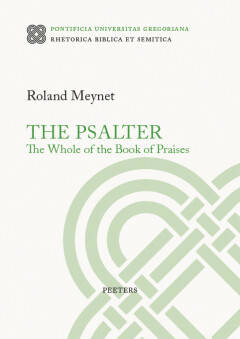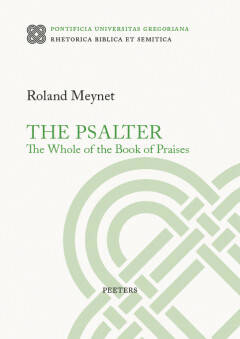
- Retrait gratuit dans votre magasin Club
- 7.000.000 titres dans notre catalogue
- Payer en toute sécurité
- Toujours un magasin près de chez vous
- Retrait gratuit dans votre magasin Club
- 7.000.0000 titres dans notre catalogue
- Payer en toute sécurité
- Toujours un magasin près de chez vous
174,95 €
+ 349 points
Description
Each of the five books of the Psalter has proved to be composed and well composed. The same is true of the Book of Praises as a whole. The procedures of biblical rhetorical analysis have made possible to show it, despite the shortcomings of a research that could hardly be based on many earlier works. The tradition saw a correspondence between the five books of the Psalter and the five books of the Torah. In the Torah, God speaks to people through the wonders he accomplishes in their favour, and then through the law he enacts; in this way he teaches them, in accordance with the meaning of the word tora. In the Psalter, it is man who speaks to God, who tells him of his misfortunes, who calls on him for help, who also praises him for his salvation. The oppressed psalmist sometimes claims innocence, but God makes him aware of his sin. Then he confesses his faults and asks for forgiveness. Finally, he realises that he is unable to comprehend the law, to see the path that leads to life. And he asks, insistently, to be instructed in it. From the first book, the psalmist pleads: "Make me to know your ways, Yhwh, teach me your paths!" (Ps 25:4). And he repeats it over and over again in the immense psalm of the Law: "Instruct me, O Yhwh, the way of your decrees [...] Give me understanding and I will observe your law" (119:33-34). Thus, the law engraved on stone will be written on his heart of flesh. That is the most visible and closest point of contact between the Torah and the Psalter. Moses said: "Hear, O Israel, the laws and customs that I speak in your hearing today" (Deut 5:1) and God says in the heart of the Psalter: "Listen, O my people, and I admonish you, O Israel, if you would listen to me..." (Ps 81:9). Unable to listen and understand, Israel asks to be taught the Torah. The Psalter is the healing remedy for the deafness that prevents one from hearing the Word of God, for the blindness that prevents one from seeing the path of life. Thus, the new covenant announced by the prophets of the exile begins to take shape, when God gives man a heart of flesh on which he will write his law.
Spécifications
Parties prenantes
- Auteur(s) :
- Editeur:
Contenu
- Nombre de pages :
- 308
- Langue:
- Anglais
- Collection :
- Tome:
- n° 41
Caractéristiques
- EAN:
- 9789042950382
- Date de parution :
- 31-12-22
- Format:
- Livre broché
- Format numérique:
- Trade paperback (VS)
- Dimensions :
- 170 mm x 240 mm
- Poids :
- 957 g

Les avis
Nous publions uniquement les avis qui respectent les conditions requises. Consultez nos conditions pour les avis.






